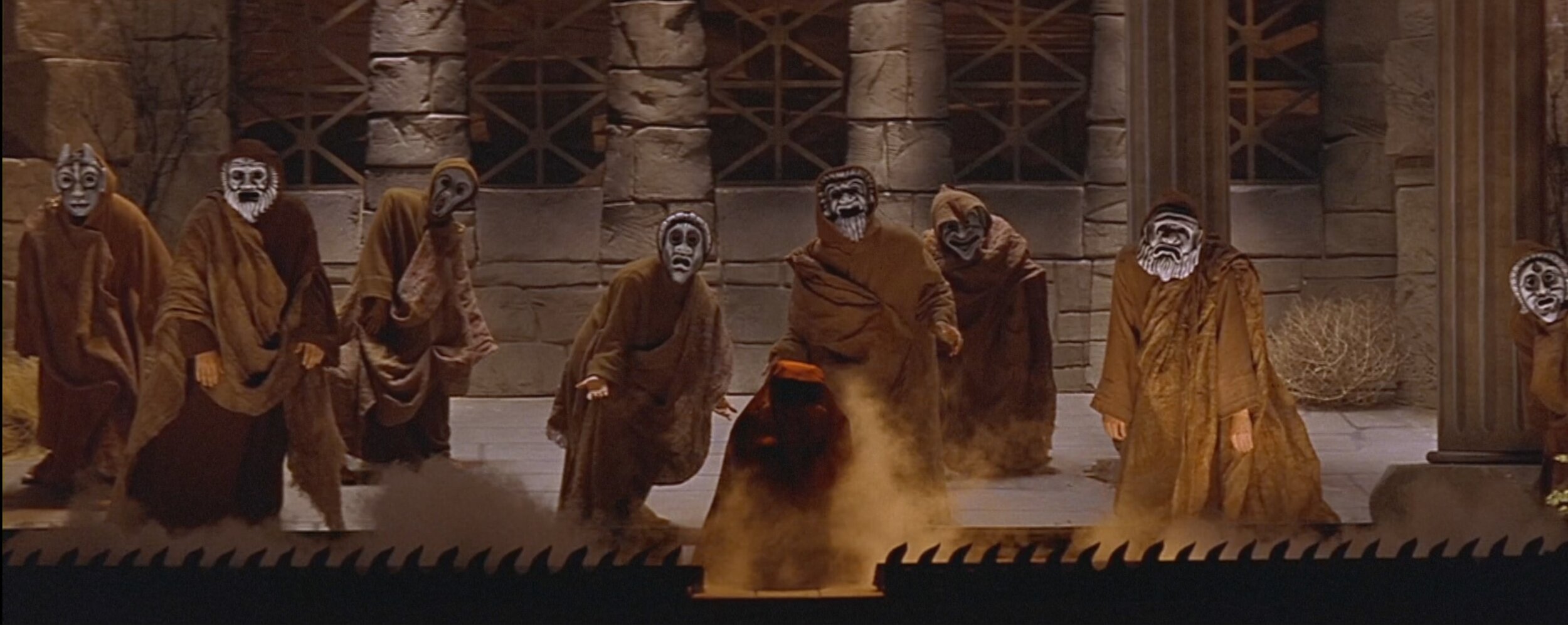[Pride 2020] Greek Tragedy In Horror Exemplified In The Scream Franchise
Whether you notice or not, Greek tragedy remains as influential in today’s pop-culture as it was for ancient Greek traditions. Take, for instance, the Great Dionysia, a festival held in Athens once a year to honor Dionysus, the god of wine. Three poets would write, produce, and, most likely, perform in three separate tragic plays. These poets also wrote one satire play to accompany, and essentially subdue, the tragic themes explored beforehand in the tragedies.
The structure of the Greek tragedy was such that the events took place over one day with a prologue to introduce the character/conflict and a chorus to explain the events and transition into the next portion of the story. Aristotle, a Greek philosopher, wrote of the exact intention of these tragedies and how modern audiences were to react to them by describing what we now know to be catharsis. Catharsis is defined by the Merriam-Webster Dictionary as “purification or purgation of the emotions.” It was thought that by viewing these great tragedies, the audiences would surely feel fulfilled afterwards: a resurgence of humanity and clarity.
While today’s horror can often contradict the intentions of the Greek tragedy – particularly the genre that people often refer to as torture-porn – there are many horror movies that pay homage to the significance of the Greek tragedy and how that affected the way stories are told in modernity. On a side note, many mainstream movies are praised for the way their stories are grounded in reality; often producing catharsis within themselves. A notable example of this in recent memory: Jordan Peele’s Get Out (2017), where you feel deeply disturbed coming out of the theatre, and yet, you have a certain clarity about humanity and the way we act (at least for me).
Scream 2 directly references Greek tragedy and its influence on the horror genre. Not only does the film open within a theatre (how meta), but it also simultaneously uses that theatre audience as a prologue into the main narrative. It details that the events of the original Scream have been exploited, for the purposes of inflating revenue, and that the surviving characters are vulnerable. While we don’t have a direct chorus, we have a play-within-a-movie which closely resembles the events of Scream and gives additional context to the plot. Coincidentally, the collegiate play which Sidney participates in is Aeschylus’ Agamemnon; the play which serves as the opening prologue in the only surviving trilogy of Greek plays, The Oresteia.
Agamemnon, King of Argos returns home from the Trojan War. With him, he has a concubine, Cassandra, who is the daughter of King Priam and Queen Hecuba of Troy. Her story goes as follows: Apollo saw that Cassandra was a woman of great beauty and granted her the gift of prophecy. When Apollo wanted her love in return, she rejected the notion of a sexual relationship, and thus, he cursed her so that no one would ever believe her prophecies; some of which directly referenced various aspects of the Trojan War. For instance, she warned against Paris’ conquest to leave for Sparta (he did) to kidnap Helen, the event that ultimately jumpstarted the Trojan War. She also prophesied that the Trojans should not accept any “gift” from the Greeks, especially not gifts that appear in the form of a giant Trojan horse.
Sidney is aware of her surroundings and while she can’t see the future, she often times will tell her friends what they must do to survive, and more importantly, what not to do. In many cases, they don’t listen. She serves as the story’s tragic hero: she’s far from perfect and often makes countless mistakes. Next, Greek tragedy has certainly influenced the way main characters are written. No longer are heroic figures portrayed as perfect beings, but rather flawed humans; a staple which modern audiences and critics praise in their protagonists. Within the original Scream, Sidney makes the mistake of having sex; a horror cliché which basically solidifies your death. She trusts her boyfriend, too, who turns out to be one-half of the killer duo.
Most Greek tragedies and plays have some level of familial conflict. This is true with Scream, as the whole series was questionably started by the mistakes her mother made. The motive for most of the killers in the franchise comes from the affair Sidney’s mother had with Billy Loomis’ father. Sidney is cursed with her family’s blood. In the play Agamemnon, Clytemnestra, wife of Agamemnon, kills both her husband and Cassandra. Similar plot points are covered in Oedipus the King, where Oedipus kills his father and then marries his mother. After the truth comes out, Oedipus’ mother, Jocasta, hangs herself and Oedipus stabs his own eyes; mutilation present, like in much of the Scream franchise.
Another interesting aspect of Agamemnon is that by the end of the play, Cassandra merely accepts that her fate is sealed. She doesn’t necessarily view her captor as the root cause of her fate, but rather, believes it to be Apollo, who brought the curse on her. In Scream 2, Sidney has a conversation with her theatre director in which he encourages her to become the fighter she is meant to be. Much like Cassandra, Sidney doesn’t view her mother (who I’m comparing to Agamemnon) as the root cause but rather herself; or her curse (Apollo). Sidney’s self-hatred and internal conflict is akin to the arc of [predominately] male protagonists of the Greek genre.
And the most notable connection to Greek tragedy comes from something much more obvious: the mask that protects the killer’s identity. In Scream 2, the singular theatre scene is key to the comparison between Greek tragedy and horror, specifically in the Scream franchise. The Greek chorus that surrounds Sidney’s character of Cassandra is protected by masks, alluding to a mysterious force behind her curse. After all, they are the ones that tell her story. Then, it can be understood that the killers – and her familial curse – are the ones that predict how her story unfolds. Tragically, there is nothing that Sidney can do to alter her twisted fate (much like Cassandra).
Concealing identity has been a large portion of classic plays and a signature theme in Scream. Often times, Sidney struggles to obtain any sliver of agency and separate her own image from her mother’s past. Scream 2’s third-act climax concludes on the very stage where Sidney portrays her literary twin in a Greek play. Through Wes Craven’s direction, the decision was made to hold off on rolling the credits until Sidney was outside of the theatre, signaling that the audience is supposed to leave their catharsis – and their emotions – on the stage in which the final bloodbath occurred.
In tragedy, the story doesn’t always end badly and neither do any of the Scream movies, especially if you ignore the final tally of bodies. By the end of each Scream movie, the original trio is always in-tact (special thanks to Scream 2 script leaks, which if not leaked would have originally marked the end of the series with Sidney’s death). I’ll admit, for a while this bothered me, but it’s almost more tragic this way; as many of Sidney’s friends and closest companions are dead. Less we not forget that in addition to the tragic elements of the Scream franchise, there is plenty of satire. The slasher movie balances sheer terror with comedy, by manipulating and exploiting horror clichés. Whether we are referencing Randy’s horror/trilogy rules or the wackiness of the killer’s motives (blame the movies), there is still fun to be had.
Much like Scream, other horror properties have taken elements from Greek tragedy. The Cabin in the Woods (2012) is the best example of this in recent memory. Not only does it pay homage to ancient traditions, as well as Greek gods and titans – but also to the horror genre. We see a plethora of monsters from Greek epics (a one-eyed Cyclops, etc). Like Scream, it recognizes and exploits the common tropes and clichés of the horror genre. Other horror movies have elements of Greek tragedy (familial conflict and mutilation), granted they aren’t as strongly influenced by Greek classics as Scream is.
My advice to you? Watch for some of these tropes within horror cinema. While Greek tragedies are some of the earliest recorded (written and oral) stories, they have the longest running thematic knacks. Many creative writing elements are taken straight from the Greek tragedy and other classical genres. These are only a few that I can point out off the top of my head, but as I continue to study film and the very thread of storytelling, I must remain aware of the classical influences in modernity. With the very recent news of a potential Scream 5, we have an opportunity to continue studying Scream’s tragedy and satire – but we must remain hyper-aware of its historical influences.


![[Pride 2020] Greek Tragedy In Horror Exemplified In The Scream Franchise](https://images.squarespace-cdn.com/content/v1/5b39608d75f9eef54c62c3f0/1591625205142-NJ70WCKY4C3I58UOU5MR/Scream+3.jpg)




![[Pride 2020] For Sean, From My POV As A Horror Fan](https://images.squarespace-cdn.com/content/v1/5b39608d75f9eef54c62c3f0/1593484114370-B09RZEZ6FWKW8TFIG0NA/Sean%2Bpic%2B1.jpg)
![[Pride 2020] Finding Jennifer; Or, How I Learned to Stop Hating Jennifer's Body](https://images.squarespace-cdn.com/content/v1/5b39608d75f9eef54c62c3f0/1593483718013-3AP23VJDN9V0MMA6V3DU/51d02d6fb673bec72cb41a366c86bb39.jpg)
![[Pride 2020] Good Manners Deconstructs Class and Racial Disparities in Brazil](https://images.squarespace-cdn.com/content/v1/5b39608d75f9eef54c62c3f0/1593398398356-6QRX0G4PK4S87TKTMF0T/1270796_goodmanners_432313.jpg)
![[Pride 2020] The Power Of Difference In Hellraiser's Queerness](https://images.squarespace-cdn.com/content/v1/5b39608d75f9eef54c62c3f0/1593397752213-22GFO5I1QW8I220F5MZM/hellraiser_hed.jpg)
![[Pride 2020] Love, Trauma And Horror](https://images.squarespace-cdn.com/content/v1/5b39608d75f9eef54c62c3f0/1593323224833-38FH4ANZTM88LXS5HG5M/Hush.jpeg)
![[Pride 2020] A Lance in the Throat: Scary Heteros in Almodóvar’s “Matador”](https://images.squarespace-cdn.com/content/v1/5b39608d75f9eef54c62c3f0/1593322407370-GXK7L0BP0D7QNTN1FFPE/ede3ca1c-1165-11e8-9ac6-bbf931a203ee4.jpeg)
![[Pride 2020] The Mischa Project](https://images.squarespace-cdn.com/content/v1/5b39608d75f9eef54c62c3f0/1593231688339-UJSAXF4NN6K1ETEK9EBS/41000240.jpg)
![[Pride 2020] Another Cheater](https://images.squarespace-cdn.com/content/v1/5b39608d75f9eef54c62c3f0/1593230510967-BTX8BAR5VDNNJO58OW7V/knife.jpg)
![[Pride 2020] Extreme Horror And Queer Affirmation In Martyrs](https://images.squarespace-cdn.com/content/v1/5b39608d75f9eef54c62c3f0/1593140634217-BSFPGD1GVAV693B06Q1X/film_martyrs.jpg)
![[Pride 2020] "And I Still Don't Even Know How I Even Survive": Navigating Hard Times With Happy Death Day 2U](https://images.squarespace-cdn.com/content/v1/5b39608d75f9eef54c62c3f0/1593140172444-2JM3W35YYCJ9803EETB7/maxresdefault.jpg)
![[Pride 2020] Life Against The Dark: Growing Up And Coming Out With Hill House's Theodora](https://images.squarespace-cdn.com/content/v1/5b39608d75f9eef54c62c3f0/1593047800584-A79Y39E6S4OIURNI63GS/IMG_1438.JPG)
![[Pride 2020] Outside Of Laramie: Joy Ride (2001) As Gay Panic Horror](https://images.squarespace-cdn.com/content/v1/5b39608d75f9eef54c62c3f0/1593046627243-BQQZOWPMVE2TZKCYT90Z/519yvHX-bLL._AC_.jpg)
![[Pride 2020] A Bumpy Road Of Queer Gothic Resistance From The Old Dark House To The Rocky Horror Picture Show](https://images.squarespace-cdn.com/content/v1/5b39608d75f9eef54c62c3f0/1592959865412-WZQ8BTV28SHJX1WHEYK5/rocky-horror-sequel-01.jpg)
![[Pride 2020] Why Bisexual Representation In Jennifer's Body Matters](https://images.squarespace-cdn.com/content/v1/5b39608d75f9eef54c62c3f0/1592959284705-3SMVYNT4ZMWN0QADZJDB/jennifers-body.jpg)
![[Pride 2020] A Tribute To Kevin Williamson](https://images.squarespace-cdn.com/content/v1/5b39608d75f9eef54c62c3f0/1592881451514-Y4OPAHSXUI63FH3T7TB2/lockwood_williamson2.jpg)
![[Pride 2020] The Power Of The Trans Monster In Bit And Switch](https://images.squarespace-cdn.com/content/v1/5b39608d75f9eef54c62c3f0/1592880971405-NFCCXW50AVB1PIPZQZVW/MV5BOWE0YjFhYTUtMWE2Zi00OWJkLTg2MzItY2VlYzUxMWE4YTM3XkEyXkFqcGdeQXVyMjE5MzYzNjU%40._V1_.jpg)
![[Pride 2020] Passive Homophobia And Its Effect On Their LGBTQIA+ Audience](https://images.squarespace-cdn.com/content/v1/5b39608d75f9eef54c62c3f0/1592794014122-9YU0ZSHP1UUC4AZS2LSL/kelly-freddyvsjason1.jpg)
![[Pride 2020] There's A Monster At The End Of This Essay](https://images.squarespace-cdn.com/content/v1/5b39608d75f9eef54c62c3f0/1592793247165-0IRK6TCXUYLCYN41EGH5/sesame-street-the-monster-at-the-end-of-this-book-9780794440237.in01.jpg)
![[Pride 2020] Bisexuality in Genre: How Catherine Tramell Warped Sexuality Forever](https://images.squarespace-cdn.com/content/v1/5b39608d75f9eef54c62c3f0/1592708306869-A25JKBJ9WESFNUM9EFZJ/6bee9e40b42062fb5a4456c27a31b2e0.jpg)
![[Pride 2020] How Evil Dead 2 Helped A Trans Girl Find Herself](https://images.squarespace-cdn.com/content/v1/5b39608d75f9eef54c62c3f0/1592707596758-2ANPLJK8JEY9XX3HTCH4/0a1ccb15-21f6-4dc9-b1b6-635c40e0046e_1.e6d75d0b581b65da70719cdba2fd46d5.jpeg)
![[Pride 2020] The Spirit Of Thomas Carroll](https://images.squarespace-cdn.com/content/v1/5b39608d75f9eef54c62c3f0/1592624295460-BJ42D5K1DFKXCFRKN7KI/pexels-photo-1671325.jpeg)
![[Pride 2020] Sickos Never Scare Me](https://images.squarespace-cdn.com/content/v1/5b39608d75f9eef54c62c3f0/1592543280046-WRDU1JSIN3JB4W7OJUGB/catwoman-700x500.jpg)
![[Pride 2020] Lovecraft, Horror And Questioning Sexuality](https://images.squarespace-cdn.com/content/v1/5b39608d75f9eef54c62c3f0/1592542591836-SJXZY6P0OZUKZY8R1F6E/cthulhupostbig.jpg)
![[Pride 2020] In Defense Of And Against Richie's Secret In It: Chapter 2](https://images.squarespace-cdn.com/content/v1/5b39608d75f9eef54c62c3f0/1592457692112-AKTBKSAQ9GSR1DI8HIX9/5ca22ee726a592e1c6c4b42b379af52b9d6f09f5.jpg)
![[Pride 2020] Bloodthirsty Villains And Homicidal Maniacs...But Make It Gay](https://images.squarespace-cdn.com/content/v1/5b39608d75f9eef54c62c3f0/1592457031919-F7C0J9H77JJQ4H0S69KT/630e2b1afaaafb06d9728b9627532756.jpg)
![[Pride 2020] A Life Changing Excision](https://images.squarespace-cdn.com/content/v1/5b39608d75f9eef54c62c3f0/1592359171589-LWRXA6B3UHFSBL4WXIB4/Excision-Pic-2-800x330.png)
![[Pride 2020] Drag Me to Hell: An Incomplete History of the Intersection of Drag and Horror](https://images.squarespace-cdn.com/content/v1/5b39608d75f9eef54c62c3f0/1592358005266-TM3GTK2Q0UHANROZKE29/Nightclub+of+the+Living+Dead.png)
![[Pride 2020] From Villains To Heroes: Imperfect Women In Horror](https://images.squarespace-cdn.com/content/v1/5b39608d75f9eef54c62c3f0/1592267521002-M5YENUAM359R1LFXRKDK/intro-1514398906.jpg)
![[Pride 2020] "I always thought the only alien in this high school was me" - Navigating Identity In The Faculty](https://images.squarespace-cdn.com/content/v1/5b39608d75f9eef54c62c3f0/1592266793030-0M18Z90CRBEF2LDW3178/5142466d6f362f188229058788d9af42.jpg)
![[News] Fantasia Announces First Wave of Films for Upoming Virtual Edition!](https://images.squarespace-cdn.com/content/v1/5b39608d75f9eef54c62c3f0/1591726727571-6WT5HVLF49OHM2O5ZSKD/FT20-Poster-8.5x11-EN.jpg)
![[Pride 2020] Ghosts and Gaslighting](https://images.squarespace-cdn.com/content/v1/5b39608d75f9eef54c62c3f0/1591563244595-6UZ14XFO5V5M62AA1BX4/the-conjuring-house.jpg)
![[Pride 2020] Queer Comforts In Horror](https://images.squarespace-cdn.com/content/v1/5b39608d75f9eef54c62c3f0/1592120643746-46RN24C15MX1LTESB6DS/The+Lodge+Still.jpg)
![[Pride 2021] There is Comfort in Horror](https://images.squarespace-cdn.com/content/v1/5b39608d75f9eef54c62c3f0/1624734412832-I5RXQ5L6HW8REWISIXSF/repo-2.0.jpg)
![[Pride 2023] Scream isn’t Queer Enough](https://images.squarespace-cdn.com/content/v1/5b39608d75f9eef54c62c3f0/1686227088525-FZQ2Q638KCOLF0FVO9VV/Jasmin-Savoy-Brown-Mindy-Meeks-Martin-Scream-VI.jpg)